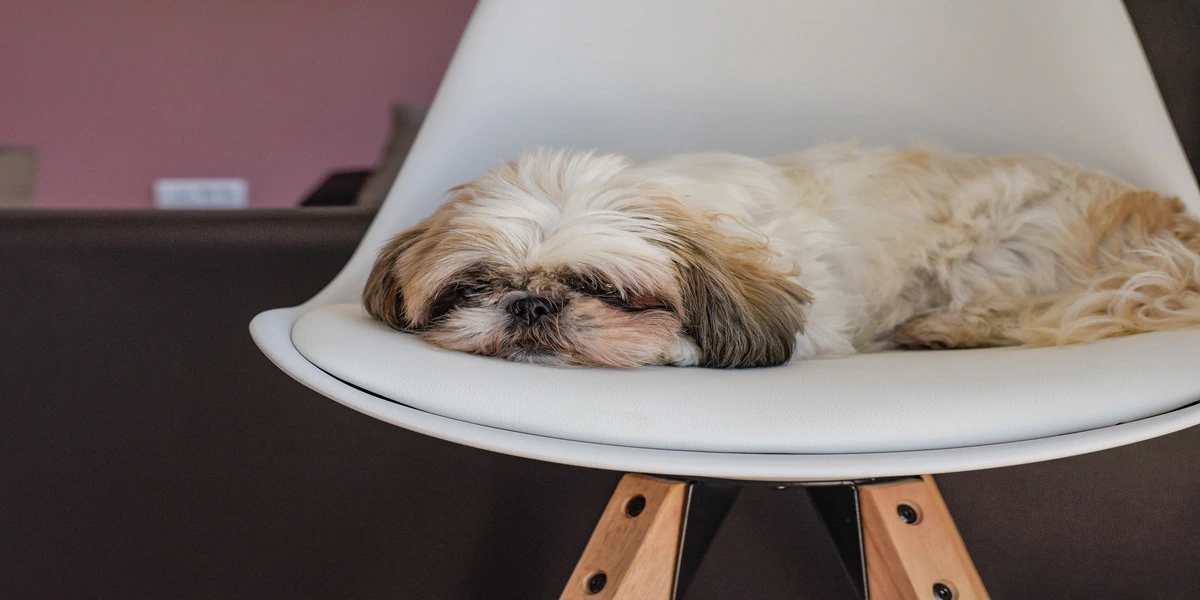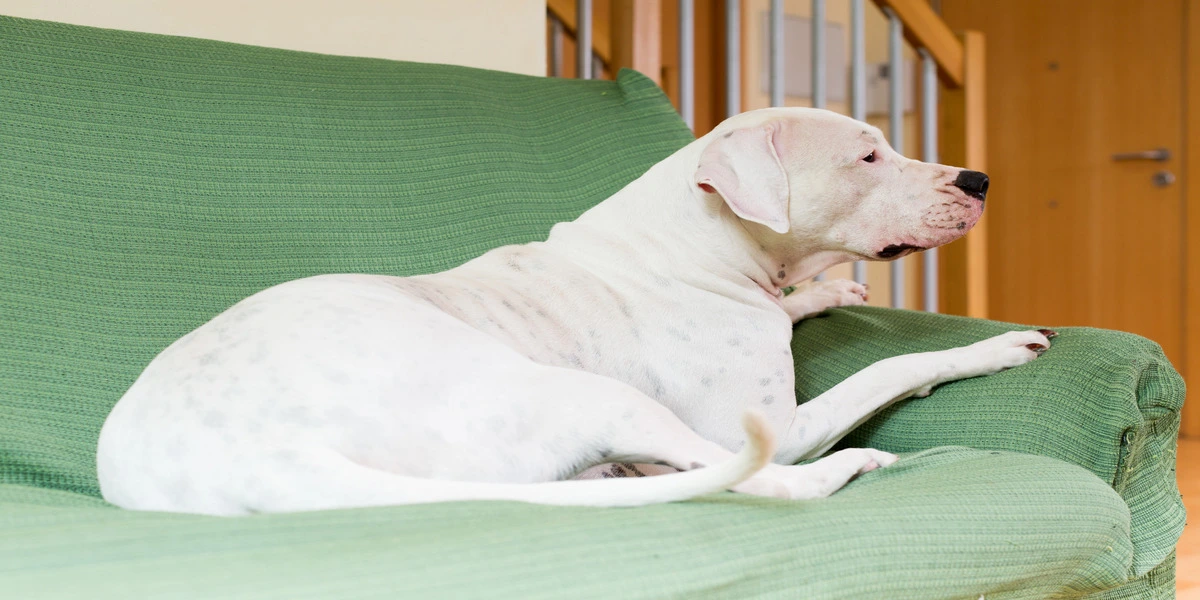Ever noticed your dog curled up on the couch, catching Z’s for hours? You might find yourself wondering: is this normal, or should I be worried? It’s easy to assume that if your dog is sleeping a lot, something’s wrong, but that’s not always the case.
n fact, most dogs sleep between 12 to 18 hours a day—more than we might think! But not all naps are created equal. How much rest your dog needs can vary based on things like age, breed, and overall health. Some dogs naturally love to snooze more than others, while some breeds practically have an endless supply of energy.
In this blog, we’ll dive into the whys and hows of your dog’s snooze habits. I’ll share some insights into why your dog might be sleeping a lot, how much sleep is too much, and when it’s time to check in with the vet. Let’s figure this out together, and hopefully, you’ll get a better idea of whether you should be grabbing a pillow for yourself or making that vet appointment.
- Why Do Dogs Sleep So Much?
- What Influences Your Dog’s Sleep Patterns?
- When Is Sleeping Too Much a Concern?
- Common Health Conditions That Cause Excessive Sleep
- How Much Sleep Should Your Dog Be Getting?
- Tips to Ensure Your Dog Gets the Right Amount of Sleep
- Can Anxiety or Stress Cause Excessive Sleep?
- FAQ: Common Questions About Dogs and Sleep
- Conclusion
Why Do Dogs Sleep So Much?
Dogs’ Natural Sleep Cycles
You know how humans need a solid 7-8 hours of sleep every night? Well, dogs—especially adult dogs—need their own version of that, but in a more spread-out, intermittent way. They usually sleep between 12 and 18 hours in a 24-hour period. Yes, you read that right—18 hours.
But here’s the thing: not all that sleep is a deep slumber. Dogs mix up their deep and light sleep in short spurts throughout the day. It’s kinda like if you had short power naps instead of a full, solid block of sleep every night. These naps help them recharge, and they’ll typically sleep in the same places. We’ve all seen a dog zonked out on the floor, their head resting in the same spot day after day, right?
Differences by Age and Breed
Just like us, dogs’ sleep needs change over time. Puppies? They need a lot of sleep—often up to 20 hours a day. They’re growing and developing fast, so all that sleep is crucial for them. It’s a little like how we feel sleepy after a long day of work—dogs do too, but with the added perk of rapid growth!
Senior dogs, on the other hand, are more likely to sleep longer as they age. It’s their way of conserving energy because their bodies can’t handle as much activity. If your older dog is napping a lot, it’s probably just the nature of getting older—like how we look for any excuse to sit down when we get a little older!
Now, breed plays a big role too. Some dogs, like Bulldogs, Basset Hounds, or Greyhounds, are known for their napping habits. These breeds tend to sleep more because their energy levels are naturally lower. Compare that to breeds like Border Collies, which are high-energy dogs, and you’ll find they need less downtime and more active playtime.
What Influences Your Dog’s Sleep Patterns?
Environment and Lifestyle Factors
Have you ever tried to fall asleep when there’s noise everywhere, or when you feel unsafe? Your dog’s sleep isn’t all that different. Their surroundings play a big role in how well and how much they sleep. A peaceful environment means deeper sleep, while constant distractions like loud noises or a restless environment might keep them up, even if they’re tired.
So, take a quick look around: is your dog’s bed placed somewhere quiet? Is there a lot of commotion in your house? Dogs need a bit of calm, just like we do, to truly get that restful sleep.
The Role of Physical Activity
Dogs are like us in many ways. The more active they are, the more they’ll need to sleep to recover. Have you noticed that after a long walk or an intense game of fetch, your dog might crash for hours? That’s their body saying, “Thanks, I needed that.”
On the flip side, if your dog isn’t getting much exercise, it can lead to boredom. And trust me, a bored dog is usually a sleepy dog. They may end up just resting all day because they don’t have anything stimulating to do. That’s why walks, playtime, or even simple training sessions can give them the physical and mental boost they need to sleep soundly at night
The Dog’s Diet and Sleep
Just like how we’re affected by what we eat, dogs feel the difference too. If you’ve ever had a sugar overload before bed, you know it’s hard to fall asleep afterward. A dog’s diet works the same way. Poor-quality food can make them sluggish and lethargic. A balanced, nutritious diet, however, helps keep them energized and allows them to get good, quality rest. If you’ve recently changed your dog’s food and noticed a spike in sleepiness, this might be a factor.
When Is Sleeping Too Much a Concern?
Identifying Symptoms of Fatigue vs. Lethargy
So, you’ve noticed your dog sleeping more than usual. At first, it seems normal—until it feels like every time you turn around, they’re asleep again. Here’s the thing: it’s okay for a dog to catch up on rest. But when they start acting lethargic, there’s a bit of a difference.
Fatigue means your dog needs to rest after a fun run or an afternoon of playing tug-of-war. This type of tiredness is normal, and a little napping helps them feel better.
Lethargy, on the other hand, is when your dog feels always tired. Like, no matter how much they sleep, they just don’t seem to have energy. They may even drag themselves around or show no interest in food or play. If this sounds familiar, then it might be time to look deeper.
Warning Signs of Health Conditions
Sure, your dog might just be catching up on their sleep after a busy day—but if you notice other signs that go beyond tiredness, you’ll want to pay attention. Sometimes, excessive sleep could indicate underlying health problems.
For example, if your dog’s sleeping habits suddenly change, along with things like loss of appetite, excessive drooling, or changes in behavior, it could be a signal that something’s off. Dogs are experts at hiding pain, so a sudden desire to sleep more might just be their way of dealing with discomfort or fatigue caused by conditions like joint pain or internal issues.
Common Health Conditions That Cause Excessive Sleep
Dogs can’t always tell us how they’re feeling, but there are certain health conditions that can lead them to sleep more than usual. If your dog’s always sleepy and other symptoms pop up, here are some conditions to be aware of:
Canine Hip Dysplasia
If you have a larger breed dog, especially a Labrador or German Shepherd, you might’ve heard about hip dysplasia. This condition, which affects the hip joints, causes pain and stiffness that makes movement more difficult. As a result, dogs with hip dysplasia tend to sleep more—partly because moving around is uncomfortable.
They might show other signs like difficulty standing up after sleeping, limping, or reluctance to exercise. If you notice this, it’s time to chat with the vet.
Heart Disease in Dogs
Heart disease isn’t just a concern for humans—it affects dogs too. Symptoms can range from fatigue to trouble breathing, and as the heart struggles to do its job, your dog might sleep more often to conserve energy. Heart disease often affects senior dogs, but younger pups can suffer from heart conditions too.
If your dog is showing any signs of coughing, difficulty walking, or heavy breathing, don’t hesitate to talk to your vet. They can perform tests to rule out any serious issues.
Arthritis and Pain-Induced Sleep
Old or young, pain can make your dog seek more rest. Dogs often hide their discomfort, so it can be easy to miss the subtle signs. Arthritis, which causes inflammation and pain in the joints, is common in older dogs.
A dog with arthritis may seek out warmer spots to sleep or have trouble moving after a nap. If your pup isn’t as playful or seems stiff after getting up, a vet check might help diagnose arthritis or another condition that requires management.
Sleep Apnea
This one is a bit more rare, but some dogs suffer from sleep apnea—yes, just like people! This means that your dog might stop breathing for short periods while asleep, causing interrupted rest and leaving them feeling fatigued during the day. You’ll often notice a dog with sleep apnea struggling to settle into a deep sleep, or breathing heavily when napping.
How Much Sleep Should Your Dog Be Getting?
Average Sleep Duration Based on Age and Breed
Here’s the thing about dog sleep: it’s not a “one-size-fits-all” deal. Depending on their age and breed, your dog may need more—or less—sleep. Here’s a little breakdown:
- Puppies: 18-20 hours of sleep a day is pretty normal. They’re growing, developing, and their bodies need extra sleep to stay healthy.
- Adult Dogs: Typically sleep 12-14 hours a day. Some dogs, especially working breeds or high-energy dogs like Border Collies, might sleep on the shorter end of the spectrum.
- Senior Dogs: Much like humans, older dogs need more sleep. Aim for 14-18 hours a day, but keep an eye out for any abnormal sleep patterns that might signal health issues.
Breeds also play a role. Smaller, more sedentary breeds (like Bulldogs) often sleep more, while bigger, active breeds (like Huskies or Collies) may sleep less but require tons of mental stimulation and play to stay content.
Puppies and Senior Dogs
As mentioned earlier, puppies sleep the most—they’re growing rapidly, after all! On the flip side, older dogs sleep more because their bodies take longer to recover, and they need to conserve energy. So if your dog is in either of these life stages and seems to nap constantly, it’s probably just their body’s way of coping with growth or aging.
Tips to Ensure Your Dog Gets the Right Amount of Sleep
Create a Comfortable Sleep Environment
If there’s one thing you should take away from this blog, it’s that your dog’s sleep environment matters. You wouldn’t want to sleep in a place with constant noise or traffic, right? Your dog feels the same way. Make sure they have a quiet spot to rest, whether it’s their own comfy bed in a corner, or somewhere that feels safe and cozy.
Having a consistent sleep spot helps establish routine—dogs are creatures of habit after all. The more familiar and calm their bed space is, the better they’ll sleep.
Regular Exercise and Mental Stimulation
Here’s something to think about: dogs that get plenty of exercise tend to have better sleep. After all, if they’ve run around, played, and burned off energy, they’re ready for some well-deserved rest. Be sure your dog gets daily walks or active playtime to keep their body—and their mind—engaged. It’s important not to let them get too bored, as that can lead to restlessness.
And don’t forget the brain! Mental exercise through training sessions or interactive toys can wear your dog out, too.
Consistent Feeding Times
Finally, consistency in feeding helps. Dogs thrive on routine—so setting regular meal times helps get them into a natural rhythm of sleep. Avoid late-night treats or meals too close to bedtime, as it might disrupt their sleep cycle.
Can Anxiety or Stress Cause Excessive Sleep?
Understanding the Emotional Life of Dogs
Dogs aren’t just physical beings; they have feelings, too. Stress and anxiety can affect their sleep just like it does ours. If there’s a lot of chaos in your house, a new pet, or if your dog is struggling with separation anxiety when you leave, they might sleep more as a coping mechanism.
However, excessive sleep due to emotional stress isn’t ideal. If your dog seems withdrawn or unusually sleepy due to anxiety, finding ways to comfort and soothe them can help. Techniques like gentle reassurance, providing a safe space, or calming chews and toys can make a big difference in their emotional well-being.
How to Help Your Dog Cope with Stress
To help your dog cope, be sure to create a calm, predictable environment. Try relaxing walks, peaceful playtime, and even cuddling together. If your dog’s anxiety is significant, consult your vet—they may recommend special training, therapy, or even medication to help your dog feel more secure.
FAQ: Common Questions About Dogs and Sleep
How can I tell if my dog is sleeping too much?
Watch for signs of lethargy, like disinterest in food, toys, or daily activities. If your dog is sleeping but seems “checked out” all the time, it’s worth reaching out to your vet for advice.
Is excessive sleep ever linked to depression in dogs?
Yes, it can be. Just like humans, dogs can suffer from depression, often triggered by changes in their environment or routine. It’s important to track changes in behavior and seek help from a vet if you’re worried.
Conclusion
In the end, when your dog is sleeping a lot, it’s usually nothing to worry about—but it’s always good to keep an eye on them. Whether it’s due to age, breed, or simple rest after a fun day of playing, dogs’ sleep patterns vary just as ours do. Pay attention to signs of lethargy and discomfort, and adjust their environment or activity levels accordingly.
Most importantly, your dog’s well-being depends on your ability to notice the little things. By staying in tune with your dog’s sleep habits and overall mood, you’ll help keep them healthy, happy, and well-rested—just like you.






